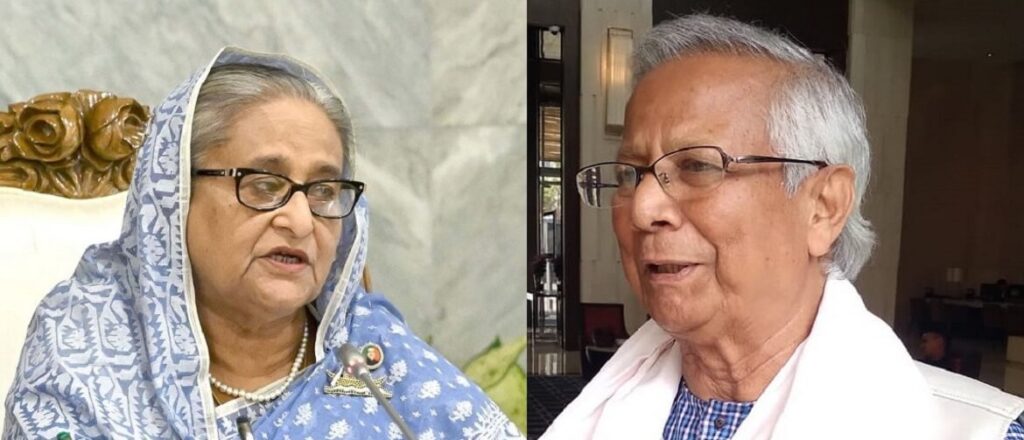By Naveed-Ul-Hasan
Sheikh Hasina has been a towering figure in Bangladeshi politics, guiding the country through transformative economic growth and significant political change for more than a decade. However, as all political tenures eventually come to an end, speculation about the post-Hasina era is rife.

This speculation often focuses on who might succeed her and what that would mean for Bangladesh’s domestic and international landscape. One potential figurehead is Dr. Muhammad Yunus, the Nobel Laureate whose work in microfinance has garnered global acclaim. The hypothetical emergence of a “Yunus Era” in Bangladesh politics could herald a significant shift in the nation’s foreign policy, particularly in its relationships with regional powers such as India and China, as well as its role in global platforms.
Under Sheikh Hasina, Bangladesh’s foreign policy has been characterized by pragmatism, strategic balancing, and an emphasis on economic diplomacy. Hasina’s tenure saw a deepening of ties with India, particularly in areas of trade, connectivity, and security. This relationship was often framed within the context of mutual benefit, with both nations working together to address shared concerns such as cross-border terrorism, insurgency in India’s northeastern states, and economic development.
Hasina also navigated Bangladesh’s relationship with China with care, recognizing the importance of Chinese investments in infrastructure while maintaining a delicate balance with India. This balancing act was a hallmark of her foreign policy, allowing Bangladesh to benefit from both neighbors without becoming overly dependent on either.
Bangladesh’s role in regional organizations, such as the Bay of Bengal Initiative for Multi-Sectoral Technical and Economic Cooperation (BIMSTEC) and the South Asian Association for Regional Cooperation (SAARC), was also strengthened under Hasina. Her government’s active participation in global forums, including the United Nations, underscored Bangladesh’s growing influence on the international stage.
The potential political demise of Sheikh Hasina, whether through electoral defeat, resignation, or other means, raises questions about the future trajectory of Bangladesh’s foreign policy. As a leader, Hasina has been both praised for her economic stewardship and criticized for her increasingly authoritarian tendencies. Her departure could lead to significant shifts in the political landscape, particularly if a new leader with a different vision for Bangladesh emerges.
One such potential leader is Dr. Muhammad Yunus, whose global reputation as a pioneer of microfinance and social business stands in stark contrast to the political machinations of traditional Bangladeshi politics. Although Yunus has not held political office, his influence in Bangladesh’s civil society and his international stature make him a compelling figure in any discussion about the country’s future leadership.
If Dr. Muhammad Yunus were to assume a leadership role in Bangladesh, either directly or as a key influencer in a new government, it is likely that the country’s foreign policy would undergo significant changes. Yunus’s philosophy of social business, which emphasizes sustainable development and poverty alleviation, could translate into a foreign policy that prioritizes human development and equitable economic partnerships over traditional geopolitical concerns.
Yunus’s emphasis on grassroots empowerment and social entrepreneurship could lead to a foreign policy that seeks to position Bangladesh as a leader in global efforts to address poverty, climate change, and social inequality. This would likely involve greater engagement with international organizations and NGOs, as well as a more prominent role in global initiatives such as the United Nations’ Sustainable Development Goals (SDGs).
One of the most significant aspects of a potential Yunus-led foreign policy would be its approach to Bangladesh’s relationships with India and China. Under Hasina, Bangladesh has maintained a careful balance between these two regional powers, leveraging economic opportunities while avoiding entanglement in their geopolitical rivalry.
A Yunus-led government might seek to redefine these relationships in ways that reflect his own values and priorities. With India, this could mean a shift towards a more people-centric approach, emphasizing cross-border initiatives that directly benefit ordinary citizens, such as improved healthcare, education, and disaster management cooperation. Yunus’s focus on social business could also lead to greater collaboration in areas like microfinance and rural development, building on his own work in these fields.
With China, Yunus might seek to renegotiate some of the large-scale infrastructure projects that have been a hallmark of Sino-Bangladeshi relations under Hasina. While not rejecting Chinese investments outright, Yunus could push for terms that are more favorable to Bangladesh, ensuring that projects are sustainable, environmentally sound, and aligned with the country’s long-term development goals. This could involve a greater emphasis on transparency and accountability in how Chinese funds are used, as well as a focus on ensuring that local communities benefit from these projects.
In the Yunus era, Bangladesh’s role in regional organizations like SAARC and BIMSTEC could evolve to reflect a new set of priorities. Yunus’s commitment to social and economic justice might lead to a stronger focus on issues such as human rights, poverty reduction, and climate resilience within these forums. Bangladesh could position itself as a regional leader in advocating for policies that address the needs of the most vulnerable populations, both within its borders and across South Asia.
Globally, a Yunus-led Bangladesh might seek to amplify its voice on issues such as microfinance, social business, and climate change. Yunus’s global network and his reputation as a thought leader in these areas could be leveraged to position Bangladesh as a key player in international efforts to promote sustainable development. This could involve greater collaboration with international organizations, donor agencies, and other countries that share Bangladesh’s commitment to these issues.
While the emergence of a Yunus-led Bangladesh presents many opportunities, it would also face significant challenges. One of the most immediate would be the need to navigate the complex domestic political landscape, where entrenched interests and traditional power structures could resist Yunus’s vision for change. The transition from Hasina’s authoritarian style of governance to a more inclusive, participatory model would require careful management to avoid destabilizing the country.
Internationally, Yunus would need to balance his idealism with the pragmatic realities of geopolitics. While his focus on social and economic justice is laudable, it could also create friction with countries that prioritize strategic interests over human development. Managing these tensions while staying true to his principles would be a key test of Yunus’s leadership.
Another challenge would be the economic implications of renegotiating existing agreements with major powers like China. While ensuring that these agreements align with Bangladesh’s long-term interests is important, there is a risk that pushing too hard could lead to a withdrawal of investment or a cooling of relations. Striking the right balance between assertiveness and diplomacy would be crucial.
The potential political demise of Sheikh Hasina and the hypothetical rise of Dr. Muhammad Yunus as a key figure in Bangladesh politics could usher in a new era for the country, both domestically and in its foreign relations. While the Yunus era would likely bring a fresh perspective to Bangladesh’s foreign policy, emphasizing social business, sustainable development, and human rights, it would also face significant challenges in navigating the complexities of regional and global politics.
Yunus’s vision for Bangladesh could redefine the country’s relationships with its neighbors, particularly India and China, and position it as a leader in global efforts to address some of the most pressing challenges of our time. However, realizing this vision would require careful diplomacy, strategic foresight, and a commitment to balancing idealism with the practical realities of governance.
As Bangladesh stands at a potential crossroads, the prospect of a Yunus-led future offers both hope and uncertainty. Whether or not Yunus ultimately plays a direct role in shaping Bangladesh’s future, the values and principles he embodies are likely to continue influencing the country’s path in the years to come.
Author: Naveed-Ul-Hasan – Distinguished scholar pursuing his PhD in International Relations. He is a Visiting lecturer at Karakoram International University. His research primarily investigates the strategic relations between Pakistan, China, India, and the USA. Additionally, his scholarly interests encompass a wide range of topics within South Asian studies, including extremism, radicalization, terrorism, the foreign policies of major global powers, and regional issues.
(The opinions expressed in this article are solely those of the author and do not necessarily reflect the views of World Geostrategic Insights).







